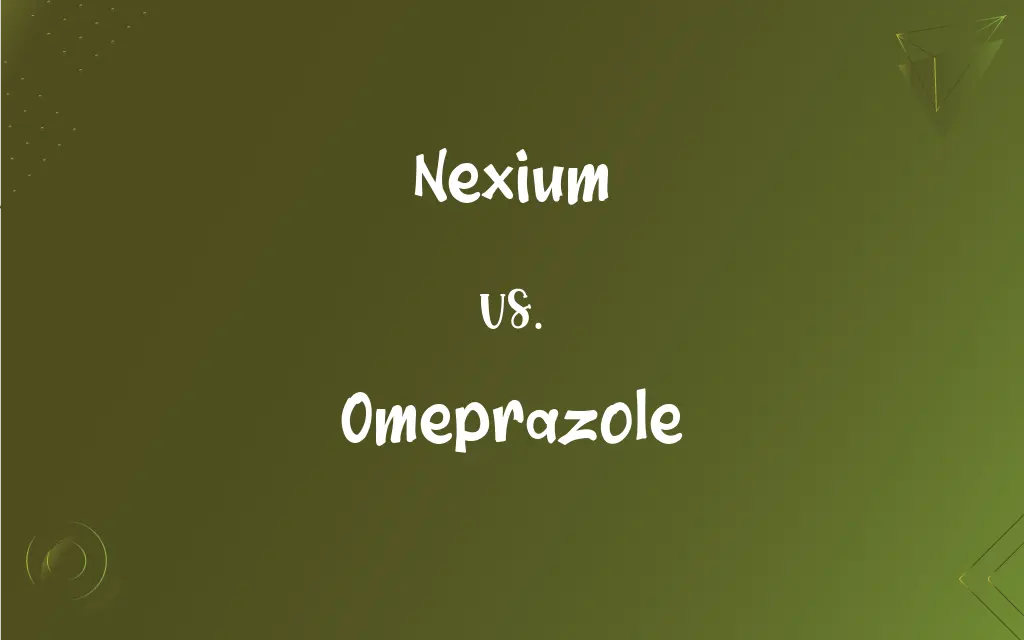Nexium vs. Omeprazole: What's the Difference?
Edited by Aimie Carlson || By Janet White || Published on September 7, 2024
Nexium is a brand name for esomeprazole, a proton pump inhibitor (PPI) used to treat acid reflux. Omeprazole is a similar PPI available as a generic drug.

Key Differences
Nexium and omeprazole are both proton pump inhibitors, medications that reduce stomach acid production. Nexium, the brand name for esomeprazole, is often marketed as offering more targeted relief for gastroesophageal reflux disease (GERD) and related conditions. Omeprazole, available as a generic medication, is also effective in treating these conditions but may differ in its molecular structure.
Esomeprazole, the active ingredient in Nexium, is a newer medication compared to omeprazole. It is considered a more refined version, designed to provide longer lasting acid control with potentially fewer side effects. Omeprazole, on the other hand, has been used for a longer time and has a well-established safety and efficacy profile for treating acid-related disorders.
The main chemical difference between Nexium and omeprazole lies in their molecular configurations. Nexium contains the S-enantiomer of omeprazole, which is thought to be more effective in inhibiting acid production. Omeprazole contains a mixture of both S- and R-enantiomers. This difference may affect how the drugs are metabolized by the body and their subsequent effectiveness in treating GERD.
Cost and availability are also distinguishing factors between Nexium and omeprazole. As Nexium is a brand-name drug, it may be more expensive than omeprazole, which is available as a generic. Patients often choose between the two based on insurance coverage, cost, and physician recommendation.
Despite their differences, both Nexium and omeprazole are effective in treating acid reflux, peptic ulcers, and other conditions related to excess stomach acid. The choice between them may come down to personal preference, medical history, and the specific recommendations of a healthcare provider.
ADVERTISEMENT
Comparison Chart
Active Ingredient
Esomeprazole
Omeprazole
Molecular Form
Contains only the S-enantiomer
Contains a racemic mix of S- and R-enantiomers
Cost
Generally more expensive
Less expensive, available as generic
Brand vs. Generic
Brand name
Available as a generic
Onset of Action
May provide quicker relief in some patients
Effective, but onset may vary
ADVERTISEMENT
Nexium and Omeprazole Definitions
Nexium
The active ingredient in Nexium.
Nexium, containing esomeprazole, treats stomach ulcers.
Omeprazole
Omeprazole heals stomach ulcers.
She was prescribed omeprazole for her peptic ulcer.
Nexium
A brand-name medication for acid reflux.
He takes Nexium daily to manage his GERD symptoms.
Omeprazole
Omeprazole controls stomach acid.
Omeprazole helps him avoid the discomfort of acid reflux.
Nexium
Nexium effectively reduces heartburn.
Nexium offers her quick relief from heartburn.
Omeprazole
A generic drug for acid reduction.
Omeprazole has effectively treated his acid reflux.
Nexium
Nexium is prescribed for GERD.
Her doctor recommended Nexium for long-term GERD management.
Omeprazole
Omeprazole is a proton pump inhibitor.
As a PPI, omeprazole reduces her stomach acid levels.
Nexium
Nexium limits acid production.
To prevent damage from acid reflux, he uses Nexium.
Omeprazole
Omeprazole offers a cost-effective choice.
He switched to omeprazole for a more affordable option.
Omeprazole
A proton pump inhibitor drug, C17H19N3O3S, that suppresses gastric acid secretion and is used for the treatment of duodenal and gastric ulcers and gastroesophageal reflux disease.
Omeprazole
(pharmaceutical drug) A substituted benzimidazole (trademark Losec, Prilosec) which is a proton pump inhibitor and inhibits secretion of gastric acid, being given orally in the treatment of ulcers and gastroesophageal reflux; 5-methoxy-2-(4-methoxy-3,5-dimethyl-2-pyridylmethylsulfinyl)benzimidazole, C17H19N3O3S.
Omeprazole
Antacid (trade name Prilosec) that suppresses acid secretion in the stomach
FAQs
What is Nexium used for?
To treat GERD, heartburn, and other acid-related disorders.
Are Nexium and omeprazole safe to use long term?
Long-term use can lead to side effects; consultation with a doctor is recommended.
Is Nexium stronger than omeprazole?
Nexium may provide more targeted acid control for some patients.
Can Nexium and omeprazole be taken together?
No, they should not be taken together as they serve similar purposes.
Can I buy Nexium and omeprazole over the counter?
Both are available over the counter in lower doses.
How quickly do Nexium and omeprazole work?
Both start reducing acid within a few hours, but full effects may take 1-4 days.
What is omeprazole used for?
Similar to Nexium, for acid reflux, GERD, and ulcer treatment.
Can pregnant women take Nexium or omeprazole?
Consult a healthcare provider as risks must be evaluated.
Is there a difference in the dosage of Nexium vs. omeprazole?
Dosages may vary; follow your healthcare provider's instructions.
Can Nexium or omeprazole cure GERD?
They manage symptoms but do not cure the underlying cause of GERD.
Do Nexium and omeprazole have the same side effects?
They have similar side effects, including headache, nausea, and abdominal pain.
Can Nexium or omeprazole cause kidney problems?
Long-term use is associated with an increased risk of kidney issues.
Do Nexium and omeprazole interact with other medications?
Yes, they can interact with certain drugs; inform your doctor about all medications you're taking.
Can I stop taking Nexium or omeprazole suddenly?
It's best to taper off under medical supervision to avoid rebound acid hypersecretion.
Can I take antacids with Nexium or omeprazole?
Yes, but space them out by at least an hour.
What's the cost difference between Nexium and omeprazole?
Omeprazole is generally cheaper, especially the generic versions.
Are there any foods or drinks to avoid while taking Nexium or omeprazole?
Avoid foods that can worsen acid reflux, like spicy foods, alcohol, and caffeine.
How do Nexium and omeprazole affect acid production?
They both decrease acid production by inhibiting the proton pump in the stomach lining.
What are the long-term risks of taking Nexium or omeprazole?
Risks include nutrient deficiencies, bone fractures, and potential kidney issues.
How do I choose between Nexium and omeprazole?
Consider factors like cost, effectiveness, and your healthcare provider's advice.
About Author
Written by
Janet WhiteJanet White has been an esteemed writer and blogger for Difference Wiki. Holding a Master's degree in Science and Medical Journalism from the prestigious Boston University, she has consistently demonstrated her expertise and passion for her field. When she's not immersed in her work, Janet relishes her time exercising, delving into a good book, and cherishing moments with friends and family.
Edited by
Aimie CarlsonAimie Carlson, holding a master's degree in English literature, is a fervent English language enthusiast. She lends her writing talents to Difference Wiki, a prominent website that specializes in comparisons, offering readers insightful analyses that both captivate and inform.






































































